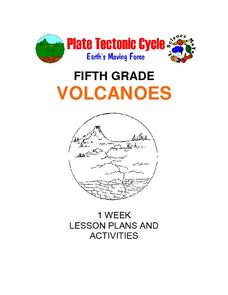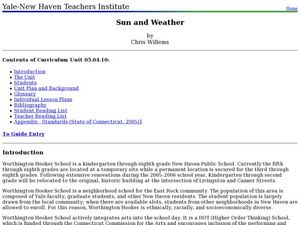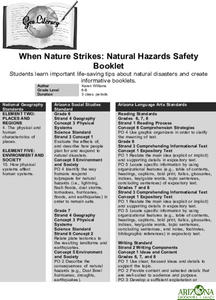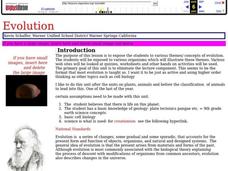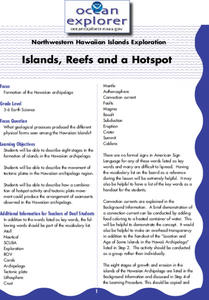Curated OER
Geology Word List
In this science worksheet, students review the vocabulary words for the separate categories related to the concept of geology.
Curated OER
Fossil Fuels (Part III), The Geology of Coal
Do not overlook this set of lessons just because your school does not have a data analysis system. There is plenty of material here to administer a complete mini unit on the formation, distribution, and properties of coal. Since it...
Curated OER
Volcanoes: Fifth Grade Lesson Plans and Activities
Fifth graders explore volcanoes and the rocks they produce using the Internet. The lab portion of the lesson prompts young scientists to compare and describe igneous rocks. Next, they critique a pair or more of books on volcanoes in...
Curated OER
Volcanoes: Fourth Grade Lesson Plans and Activities
Young geologists begin exploring volcanoes of different structures and states: active, extinct, or dormant. During the lab, they make three models and compare different types of volcanoes, including composite, cinder cone, and shield....
Curated OER
Volcanoes: First Grade Lesson Plans and Activities
Introduce young geologists to types of volcanoes during the pre-lab. First graders explore how different liquids flow with an experiment on viscosity to simulate how different types of lava flow. Next, they learn about the parts of a...
Curated OER
Volcanoes: Third Grade Lessons Plans and Activities
Discover how rocks are formed from volcanoes during a geology pre-lab activity. Third graders describe the volcanic rock samples and creating a model of Mt. Lassen, located in California. The lesson culminates in a discussion about how...
Curated OER
Volcanoes: Second Grade Lesson Plans and Activities
Young geologists explore volcanoes with a series of engaging geology activities. First, they learn the difference between magma and lava before coloring and labeling the parts of a volcano. During the lab, individuals watch a...
Curated OER
Earthquakes: Fifth Grade Lesson Plans and Activities
After learning about P waves and S waves, fifth graders view the intensity of earthquakes by examining seismographs and images of earthquake damage. Young scientists then forecasting future quakes by analyzing data about earthquakes...
Curated OER
Hazards: Second Grade Lesson Plans and Activities
Equip learners with safety knowledge in the case of an earthquake. After coloring the places to go to get help after a quake, and label places that wouldn't be safe to go after a quake, young geologists simulate three levels of...
Curated OER
Hazards: Fourth Grade Lesson Plans and Activities
Learn about damage associated with earthquakes and materials that best withstand a quake. A lab engages class members in the experimental design and construction of sturdy structures that can endure various earthquake intensities. Groups...
Curated OER
Hazards: Fifth Grade Lesson Plans and Activities
After comparing earthquake and volcanic hazards to one another, fifth graders take a closer look at damage associated with a volcanic eruption. They then create a simulation of mudslides due to a volcanic eruption. Using different...
Mr. E. Science
Volcanoes
What is the difference between a shield volcano and a cinder cone volcano? How does the flow of lava influence the type of rock that's formed? A presentation on different aspects of volcanoes answers these questions for middle school...
Curated OER
Earthquakes: First Grade Lesson Plans and Activities
First graders explore how earthquakes release energy in a set of hands-on activities. During the pre-lab, they discover how energy from an earthquake releases waves through the earth using a water-filled cup and pebbles. Youngsters...
Curated OER
Building for the Big One
Students build and test structures that can best withstand earthquakes. They create their structures from playdough, cornstarch, grape-nuts and popsicle sticks and place their structures on a "shake table."
Curated OER
Hazards: Third Grade Lesson Plans and Activities
Learners discover hazards related to volcanoes and predict the effects these hazards have on people and land. As blossoming geologists explore various volcanic eruptions, including the hazards associated with them, they create their own...
Curated OER
Earthquakes: Fourth Grade Lesson Plans and Activities
Examine earthquake intensities and ways to measure an earthquake through the comparison of the Mercalli and Richter scales. After completing the pre-lab worksheet, fourth graders compare high and low intensity quakes by testing the...
Teach Engineering
Earthquakes Living Lab: Designing for Disaster
Build and design to rock and roll. Pairs research building design in earthquake areas and use computer simulations to see the effects of earthquakes on buildings,. They then sketch and explain a building design that would withstand a...
Curated OER
Sun and Weather
How is the Earth's weather created? Middle schoolers will explain how the Sun's energy is transformed into different forms. They will perform mathematical calculations of volume, mass, and temperature. They they will explain the...
Curated OER
When Nature Strikes: Natural Hazards Safety
Middle schoolers observe the impact of natural disasters on humans, and become aware of the dangers of environmental hazards such as flash floods, tornadoes, and hurricanes.
Curated OER
Evolution
Explore the concept of evolution and cell biology; your class can work in groups to use the internet to view websites on evolution, take a quiz, and complete a lab activity.
University of Southern California
What Is The Ocean?
Go on a tour of the ocean through the lens of a scientist. Learners read maps of the ocean floor, study tide behavior, examine wave motion, and analyze components of soil. Each lesson incorporates a hands-on component.
Alabama Learning Exchange
Action at Plate Boundaries
Students diagram the spreading of the ocean floor. In this earth science lesson plan, students read an article on plate boundaries of the ocean. Students are expected to diagram the oceanic convergent boundary, and give a written...
Curated OER
Islands, Reefs, and a Hotspot
Learners describe eight stages in the formation of islands in the Hawaiian archipelago. They examine the movement of tectonic plates in the Hawaiian archipelago region, and describe how plate movement produced the Hawaiian archipelago.
Curated OER
How Deep is the Ocean
Students predict and then analyze the layout of the tectonic plates that form the ocean's floor using mapping skills and Inquiry based problem solving, They compare the depth of various regions in the ocean with the geologic age to...




